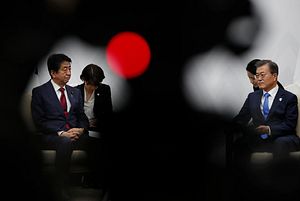Less than three months in, 2018 has already been a challenge for Japan-South Korea relations. The two governments have dealt with the domestic fallout of Seoul’s assessment of the 2015 bilateral comfort women agreement and the PyeongChang Winter Olympic Games, including North Korea’s overture to the South, have strained the bilateral relationship. To their credit, Japanese Prime Minister Shinzo Abe and South Korean President Moon Jae-in have maintained a working relationship and even made some progress. But tensions are increasing and it will take confident leadership and far-sighted diplomacy to ensure that a rupture does not occur. Neither is guaranteed.
From a distance, Japan and South Korea are more similar than they are different. They are both democracies; successful market economies that seek liberal, open trading systems; and allies of the United States. Both have been threatened with war and destruction by North Korea, both have had citizens kidnapped by North Korean agents, and both are frequent targets of North Korean cyberattacks. Seoul and Tokyo have felt Beijing’s lash – China has not hesitated to flex its considerable economic muscle when it was unhappy with South Korea or Japan.
And yet, the relationship between Tokyo and Seoul is fraught. Even in the face of a potentially existential threat from North Korea, the relations between the two countries are better characterized as contentious rather than cooperative. Those frictions threaten to undermine the united front essential to counter and contain North Korea and change its behavior.

































